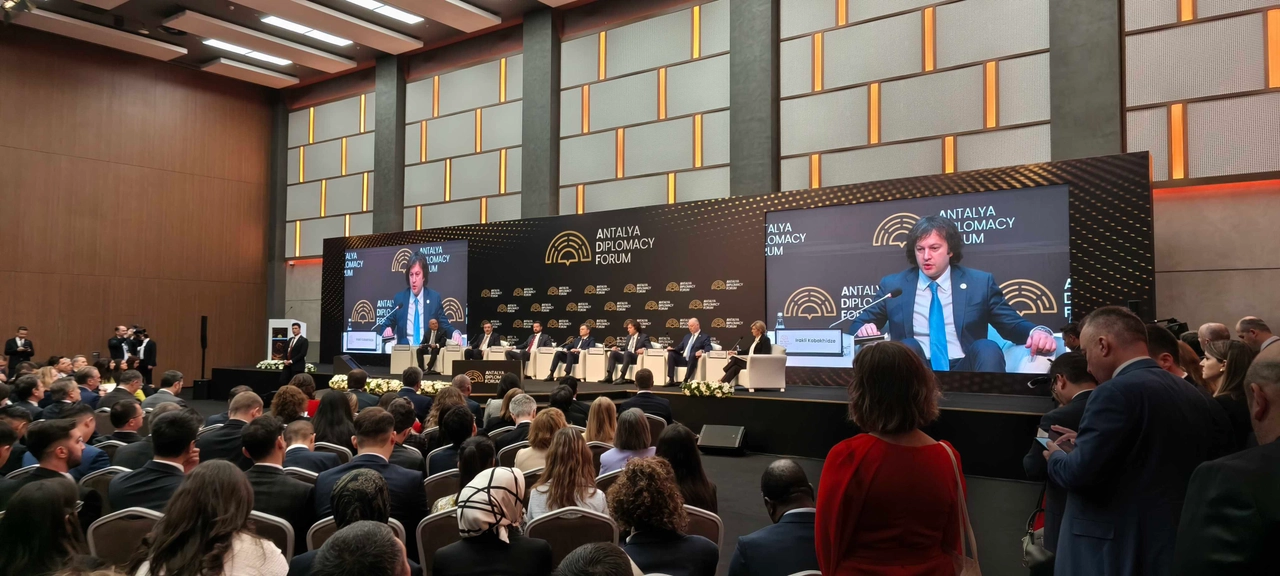Sport
Dollar
38,1588
0.3 %Euro
43,6101
1.61 %Gram Gold
3.958,7400
2.25 %Quarter Gold
6.529,2600
2.67 %Silver
39,4700
3.6 %President Erdogan set to address global leaders on the first day of the three-day event that will explore the theme, ‘Reclaiming Diplomacy in a Fragmented World’.
As global instability intensifies—from wars and rivalries to climate crises and tech disruptions—Türkiye is positioning itself as a “smart power” that champions dialogue and peace, the country’s Vice President Cevdet Yilmaz said Friday.
Speaking at the opening panel of the 2025 Antalya Diplomacy Forum, Yılmaz stressed that Türkiye aims to bridge divides in an increasingly fragmented world by balancing diplomacy with strategic capability.
“We are living in a time of polycrisis,” Yılmaz said. “Türkiye is not just a country that reacts, but one that leads and shapes the agenda in favour of peace, cooperation and multilateralism.”
The panel’s theme—Rethinking Diplomacy in the Age of Uncertainty—resonated with leaders from the Balkans, Caucasus, and beyond, many of whom echoed the call for dialogue over confrontation.
The fourth edition of the Antalya Diplomacy Forum (ADF 2025) has drawn high-level participation from across the globe, including a significant Arab presence.
The forum, organised by Türkiye’s Ministry of Foreign Affairs and held under the auspices of President Recep Tayyip Erdogan, has brought together heads of state, foreign ministers, and international representatives.
The event will bring together participants from 148 countries, including 19 heads of state and government, 52 foreign ministers, and numerous other high-ranking officials.
Later on Friday afternoon, President Erdogan is scheduled to deliver the highly anticipated inaugural address to formally open the forum, which will set the tone for discussions under the theme “Reclaiming Diplomacy in a Fragmented World.”
From security to sustainability
“There are regional and global conflicts, strategic competitions, ecological crises, and economic rivalries—especially between the US and China—that require a new approach to diplomacy,” Yılmaz observed.
He argued that the central axis of global competition has shifted from traditional security concerns to economic resilience and ecological sustainability.
“Ecological competition seems to be at the center of this new landscape,” he noted, calling for policies that can address both immediate shocks and longer-term structural challenges.
Positioning Türkiye as a crossroads of continents and civilisations, Yılmaz said: “Some countries may be new to crisis management, but we are not. Türkiye’s geopolitical location allows us to understand multiple perspectives and act as a bridge.”
He called for a reorientation of diplomacy focused on bilateral and regional cooperation to lay the groundwork for a stable, inclusive, and rules-based global order.
Milatovic: From conflict to cooperation
Montenegro’s President Jakov Milatovic praised Türkiye’s regional engagement, recalling how Balkan nations are forging meaningful partnerships with Türkiye.
“Today, we are strengthening links between Balkan nations and Türkiye based on mutual respect and shared values,” he said. “That’s how we can strengthen partnerships and work together.”
Outlining Montenegro’s foreign policy anchored on regional cooperation, NATO, EU integration, and multilateralism, Milatovic reiterated support for a “just peace” in Ukraine and reaffirmed his country’s EU accession goal by 2028—“ambitious but realistic.”
Using a metaphor to highlight geopolitical anxieties, he said: “The rift between the US and EU feels like children watching their parents fight. We hope for reconciliation—and that’s where diplomacy is vital.”

Recean: Facing fragmentation, seeking unity
Moldovan Prime Minister Dorin Recean underlined the importance of platforms like the Antalya Forum to address converging global challenges.
“The very crises we face make forums like this more necessary than ever,” he said, citing the war in Ukraine, economic uncertainty, and ideological divisions.
Recean called for renewed commitment to democratic values and multilateral institutions, warning against cynicism and defeatism. “Yes, today’s world is fragmented, but we must work to ensure the family quarrel ends with stronger partnerships.”
Reaffirming Moldova’s EU ambitions, he declared: “Our choice is to be part of the European Union… Moldova belongs in this project of peace.”
Recean also stressed the ethical dimensions of emerging technologies: “It’s not just how AI is developed—it’s how it’s deployed. The decisions we make today will shape global norms.”
Kobakhidze: Growth through peace and pragmatism
Georgian Prime Minister Irakli Kobakhidze emphasised economic pragmatism amid geopolitical turbulence, viewing multipolarity as an opportunity, not just a challenge.
“Even a small country like Georgia can benefit by diversifying its partnerships,” he said, citing trade deals with over 50 countries, including the CIS, UAE, and China.
Despite territorial disputes with Russia, Kobakhidze said Georgia maintains a peaceful approach. “We have no diplomatic relations with the Russian Federation, yet we pursue pragmatic international economic policies.”
He highlighted Georgia’s impressive growth—averaging 9.4 percent since 2021—and emphasized that peace is the foundation for progress: “Whether it’s development, regional cooperation, or EU integration—everything depends on peace.”
Zhelyazkov: Multilateralism at the crossroads
Bulgarian Prime Minister Rosen Zhelyazkov took a broader view, warning of the erosion of multilateralism that underpins global stability.
“Multilateralism is essential for the European Union’s survival,” he said, citing internal challenges like Brexit and rising Euroscepticism, as well as external threats.
While acknowledging EU divisions, he emphasised its collective strength: “A 500-million-strong market gives us unmatched negotiation power.”
He framed multipolarity as a potential enabler of more effective multilateralism. “If approached optimistically, a multipolar world can actually foster rule-based cooperation.”
Zhelyazkov praised Türkiye-led initiatives like the Black Sea Mine Countermeasures (MCM) group, calling it a “model of productive regional coordination.”
Kitarovic: Realignment, not fragmentation
Former Croatian president Kolinda Grabar Kitarovic offered a pragmatic interpretation of today’s shifting alliances.
“I don’t see fragmentation—I see a recalibration,” she said. “We’re seeing issue-based alignments grounded in pragmatic cooperation, not rigid ideological blocs.”
Kitarovic lauded Türkiye’s ability to bridge divides—working with NATO allies while engaging regional powers like Russia. “President Erdogan plays a vital role as a global interlocutor.”
She also noted the growing importance of public perception and media influence in modern diplomacy. “Politics today is increasingly personalised. Diplomacy must adapt to a world where facts and feelings are often manipulated.”
Comments
No comments Yet
















Comment